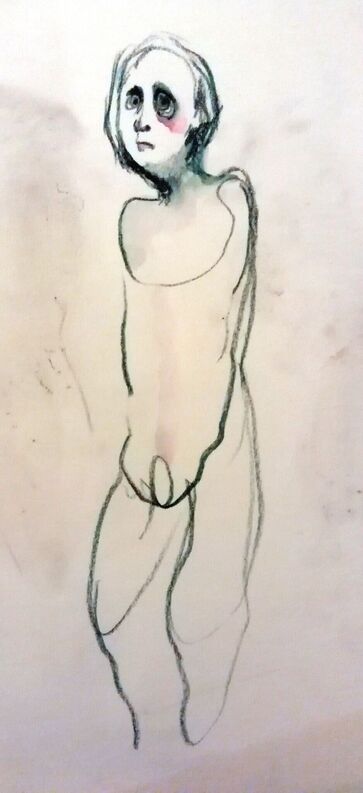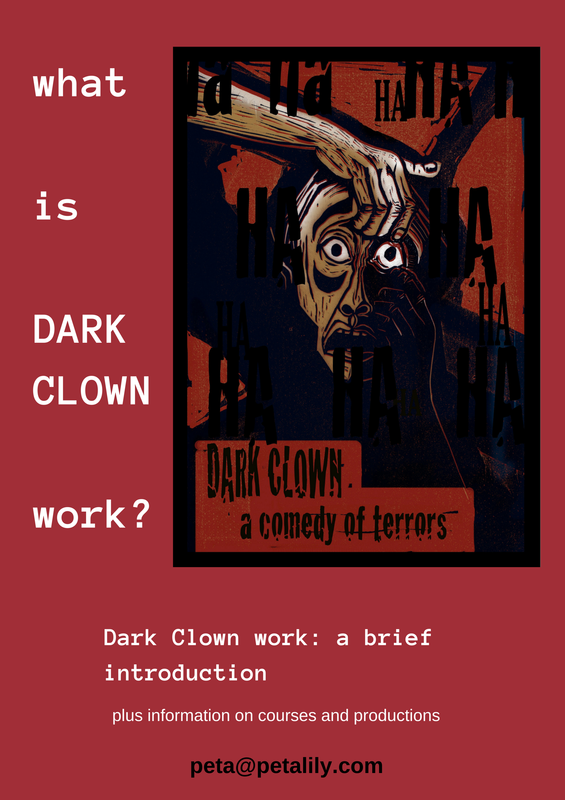 Image by EM Parry
Image by EM Parry 'One other idea I find extremely useful is that emotions like anger and resentment have the potential to be obstructive. In the workshops we were steered away from anger, self-pity, indignation etc. in favour of less defensive emotions like shame, sadness, despair ... Knowing that the territory of slightly more egotistical or aggressive emotions is liable to put up a barrier between the performer and the audience, to create antagonism, rather than letting vulnerability build pathos and evoke empathy, is invaluable.'
I have been listening lately to Brené Brown's Podcast: Unlocking Us. In the episode I have just linked, Brené speaks about using awareness of Shame as a useful step for white folx to avoid any reactivity which may arise during discussions about racism. Brown mentions the value in being able to recognise the symptoms of shame - the hot cheeks and the tunnel vision and the sweating palms. And then Brown gives some handy mantras to reframe thoughts which otherwise risk to get channelled into reactivity, defensiveness, denial and blame.
Generally in life, we normally try to escape uncomfortable emotions. The Dark Clown work has an exercise where course participants do what I call Dark Side Play, where they do a kind of Lazy Susan exercise (an inner circle facing an outer circle). (The outer circle does the exercise and rotates to a fresh partner after each turn.) Those doing the exercise are all given a Marginalised Emotion* to portray (to pretend into). The 'do-ers' have three aims 1/ to create 'a believable verisimilitude of pain and distress' 2/ to employ as many of the comedy crafts as they can remember to employ in the service of 3/ making their partner access Troubled Laughter. Emotions worked include (among others) panic, dread, grief and shame.
When I reach Red Nose Clown, I mention proprioception. I may need a more precise word - science friends, please email me! What I mean is when a spontaneous moment of play has created a sound, gesture, timbre, rhythm, phrase-length that has caused laughter. I encourage students (course participants) to develop the hunger to grow the sense-ability to take an inner snapshot so that they can reproduce what they just did. Then it can be tried again, impartially, like a scientist. Possibly, they might employ the rule of three. No harm if they don't - they can practice the 'fail', accept their emotions of the moment, or just be the presence of that new moment (play the ball where it lies) breathe, await the incoming impulse, and do something else from there - it's all good for the Clown.
This skill, or understanding of being able to feel what is manifest in your body and voice in the moment, this 'knack', once learned in Red Nose mode, can be employed in Dark Clown mode. To create Troubled Laughter, the Dark Clown performer must nurture the audience's responses and seek to stimulate and recreate laughter where possible (by recreating the physical/vocal/energetic moment which caused the laugh in the first place. It is important in Dark Clown that the duplicated sound appear to be reproduced 'involuntarily': 'The amygdala made me do it', as it were.** Why? Because, in order to keep the audience 'on the hook', the Dark Clown must sustain the 'truth' of the situation (by situation I meant the Imagined Predicament).
So there is this practice to emulate, to portray and to do this over some duration - to stay in the discomforting emotions. This is in pursuit of creating the Implication of the Audience and the Troubled Laughter. But it may just be that this exercise has, incidentally, a further (or bonus) value.
When I first encountered Clowning with Philippe Gaulier (alongside John Wright, John Lee, Phelim McDermot, Rick Kemp, and Annie Griffin) - many of us had a crunch moment. It was totally new, this being exposed, defences down, the 'bide', the 'fail', the 'shit in the pants'. The very thing that one normally wishes fervently to avoid. After Gaulier, sometime in the late 80's/early 90's I attended a workshop in Stand-up. Ivor Dembina stomped into the room where all the chairs were stacked and we, the participants were standing about. Ivor said, 'When you make me laugh, you can sit down.' Discomfort, pricking cheeks, a soupçon of fear. But I thought: 'Oh, this. This is ok. I have been here before.' And I was able to work, to try.
It is a strain, avoiding discomfort. One clamps down. Flow is compromised, or stopped completely. Life force is lost. I wonder if the visiting of the Marginalised Emotions - playing in them as one might play in mud*** - was the experience a recent Clown & Dark Clown course participant was indicating when they said:
'What surprised me was how very alive I felt after the weekend with the Dark Clown.'
* A list of the Marginalised Emotions is given in this earlier blog post Rehearsing for Darkness.
** There is another tactic (should the moment be right and not too close to the start of the scene). A repeat of the sound could be done as if, from within the ghastly Predicament, The Dark Clown is 'testing' reality in hopeless hope of getting an answer to the unanswerable question: 'What kind of a world IS this? ... Where my pain is being discounted and even laughed at?!'
*** playing with a portrayal of the Marginalised Emotions I call Dark Side Play (it incorporates the foundational skills of Comedy Craft which are imparted and drilled in the early part of the Clown & Dark Clown course).
 RSS Feed
RSS Feed
